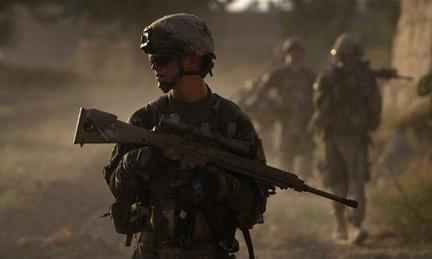 French President Nicolas Sarkozy has announced the phased withdrawal of its 4,000 soldiers serving in Afghanistan.
French President Nicolas Sarkozy has announced the phased withdrawal of its 4,000 soldiers serving in Afghanistan.
A statement said the French would follow the timetable of US withdrawals announced by President Barack Obama.
Mr Obama said 10,000 US troops would pull out this year, with another 23,000 leaving by the end of September 2012.
Afghan President Hamid Karzai welcomed the move, but the Taliban dismissed it as "symbolic" and vowed to continue fighting until all foreign forces left.
At least 68,000 US troops will remain in the country after the 33,000 have been withdrawn, but they are scheduled to leave by 2013, provided that Afghan forces are ready to take over security.
However the US reductions just announced are larger and faster than military commanders had advised.
They told the president that the recent security gains were fragile and reversible, and had urged him to keep troop numbers high until 2013.
Correspondents say the enormous cost of the deployment - currently more than $2bn (£1.25bn) a week - has attracted criticism from Congressional leaders, while the public are weary of a war that seems to have no end and has left at least 1,500 personnel dead and 12,000 wounded.
There have also been changes on the ground, notably the killing in May of al-Qaeda leader Osama Bin Laden by US forces in Pakistan.
Mission change
Mr Sarkozy's announcement came shortly after that of Mr Obama's, and followed a telephone discussion between the two leaders on Wednesday, said the Elysee Palace - the presidential office - in a statement.
The withdrawal of the approximately 4,000 serving French troops would be progressive and would take place "in a proportional manner and in a timeframe similar to the pullback of the American reinforcements", it said, beginning in the coming months.
The French president "stressed that France shared the American analysis and objectives and that it was happy with President Obama's decision".
Mr Obama's announcement, after a month-long strategy review, outlined the exit of the forces he sent to the country at the end of 2009 as part of a "surge".
In his speech, he said he had set clear objectives for the surge in December 2009 - to refocus on al-Qaeda, to reverse the Taliban's momentum, and train Afghan security forces to defend their own country.
His administration also stated the commitment would not be open-ended and that the withdrawal would begin in July 2011, he added.
"After this initial reduction our troops will continue coming home at a steady pace as Afghan security forces move into the lead. Our mission will change from combat to support."
The BBC's Paul Adams in Washington says the speech was all about reassuring the American public that the "tide of war" was receding.
Six thousand Americans have died in Iraq and Afghanistan and $1 trillion has been spent.
The initial withdrawal is expected to happen in two phases, with 5,000 troops coming home in coming months and another 5,000 by the end of the year.
The remainder of the surge reinforcements - 20,000 combat troops and an 3,000 deployed to support the operation - will be out by the end of September 2012, in time for the US presidential election.
Our correspondent says this is a quicker pace than most analysts predicted, and suggests the president does not feel he needs to leave the bulk of the surge force in place for another fighting season.
The second largest contributor to the international force in Afghanistan is the UK, which has more than 10,000 soldiers including special forces.
It has pledged to pull back forces by 2015 - and earlier if conditions allow.
US administration officials told the New York Times that the US military commander in Afghanistan, Gen David Petraeus, had not endorsed Mr Obama's decision. He recommended limiting initial withdrawals and leaving in place as many combat forces for as long as possible, they said.
Outgoing Defence Secretary Robert Gates and Secretary of State Hillary Clinton reluctantly accepted the reductions, the officials added.
Serious doubts remain about whether Afghan forces will be up to the task.
But President Karzai welcomed Mr Obama's announcement as "a good step for their benefit and the people of Afghanistan".
"I want the people of Afghanistan to be safe in their country with their own capable means," Mr Karzai said.
Security fears
There was a more ambivalent response from senior Afghan security officials who spoke to the BBC.
They stressed that neither the army nor police were yet capable of handling security alone, citing problems of enemy infiltration, drug addiction, and high desertion rates.
An Afghan official with the country's National Security Council said he hoped the withdrawal would take place progressively, and not in one fell swoop.
"We look for a long-term commitment from the United States and the international community, one that will not allow Afghanistan to fall back to the pre-civil war and Taliban days," the official, who did not want to be named, told the BBC.
"We want to remind everyone, history shows that if you turn your [back] on Afghanistan, it will have negative consequences for you."
But a farmer in a volatile district in the north-eastern province of Kundoz told the BBC: "As far as I am concerned, the American forces didn't make a difference to me and my village. So if they leave it won't affect me.
"They supported militias, commanders who kill, rape and loot here. They are hated for that at my village.''



